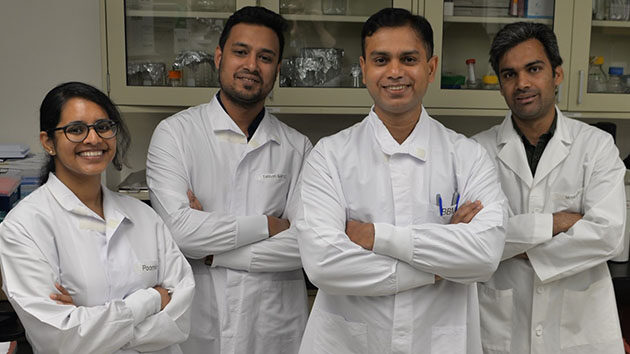$2.1M NIH Grant Awarded for Study of Tuberculosis

Albany Medical College Scientists Will Investigate Potential New Ways to Limit Lung Damage and Impairment Caused by TB
Albany Medical College scientists have been awarded a four-year, $2.1 million grant from the National Institutes of Health (NIH) to study the role of lung epithelial cells – the cells that form a mucosal barrier in the lungs – in protecting against tuberculosis (TB).
TB is a highly contagious airborne disease that primarily affects the lungs. According to the World Health Organization, it’s the world’s second-leading infectious killer (after Covid-19), the leading cause of death among people living with HIV, and a major contributor to antimicrobial resistance. Current treatment involves multiple antibiotics over several months targeting Mycobacterium tuberculosis, the bacterium that causes TB, but this often leads to toxic side effects and drug-resistant strains of the disease.
“Most people can control the lung-damaging inflammation caused by TB,” said Bibhuti Mishra, PhD, assistant professor in the Department of Immunology and Microbial Disease, who is leading the study. “But for others, post-TB lung damage persists even after successful antibiotic treatment, permanently impairing respiratory functions and leading to significant morbidity.”
Using genetically engineered mice, Dr. Mishra and his team will investigate how Interleukin-1, a protein that helps regulate immune response, interacts with lung epithelial cells to control the pathogen’s growth and prevent inflammation in the lung.
Dr. Mishra is also collaborating with scientists from GE Research, who will perform spatial analysis of immune and epithelial lung cells in the TB-infected lung, and from UMass Chan Medical School, who will analyze infected lung epithelial cells using single-cell transcriptomics.
“By identifying the molecular mechanisms that contribute to immunity against TB, we hope our research will lead to new therapies or vaccines that can help prevent TB, enhance immunity, and limit the damage it causes to the lungs,” said Dr. Mishra.
Titled “Type II alveolar epithelial cell-intrinsic IL-1 response in protective immunity against tuberculosis,” the study is funded by the NIH’s National Heart, Lung, and Blood Institute.